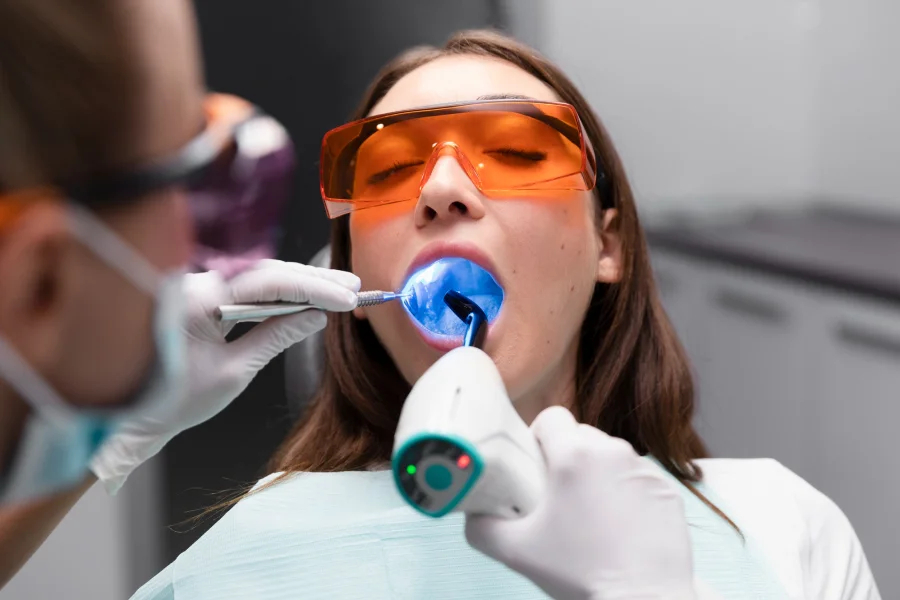
Minimally invasive dentistry in Houston has become increasingly popular as patients seek less painful and more efficient dental treatments.
This approach focuses on preserving as much of the natural tooth structure as possible while providing effective solutions for various dental concerns. Holistic dentistry is a key component of minimally invasive techniques, incorporating a whole-body approach to oral health.
What is Holistic Dentistry?
Holistic dentistry, also known as biological or integrative dentistry, recognizes the interconnection between the mouth and the rest of the body. It takes into consideration not only oral health but also overall well-being when diagnosing dental problems and selecting appropriate treatments. Holistic dental care in Houston aims to provide gentle and safe procedures while minimizing exposure to potentially harmful materials.
The Benefits of Holistic Dentistry
By embracing a holistic approach, patients can experience numerous benefits during their holistic dentistry Houston appointments:
- Safer Materials: Holistic dentists prioritize using biocompatible materials, such as composite fillings free from mercury and other toxic substances.
- Overall Health Improvement: Treating underlying dental issues can have positive impacts on systemic health conditions like cardiovascular disease and diabetes.
- Prevention Focus: By emphasizing preventive care, holistic dentists help patients maintain optimal oral health for longer periods.
- Reduced Environmental Impact: Approaching treatment sustainably reduces waste and limits exposure to hazardous chemicals commonly found in traditional dental practices.
Benefits of Minimally Invasive Dentistry
By utilizing advanced technologies and techniques, minimally invasive dentistry offers numerous benefits for patients seeking high-quality dental care.
Preservation of Natural Tooth Structure:
One of the primary advantages of this type of dentistry is its emphasis on the preservation of natural tooth structure. Traditional dental treatments often require significant removal of healthy tooth material to accommodate restorations such as crowns or fillings. However, with a minimally invasive approach, dentists strive to conserve healthy tooth structure by using more conservative treatment options whenever possible.
Improved Patient Comfort:
Traditional dental procedures can cause anxiety and discomfort for many individuals. However, one major advantage of minimally invasive dentistry in Houston is its focus on improving patient comfort throughout the treatment process. With reduced invasion into healthy tissues and nerves, patients experience minimal pain during both preventive and restorative procedures.
Reduced Recovery Time:
As minimally invasive treatments involve smaller incisions or no incisions at all compared to traditional methods, they typically result in shorter recovery times for patients. For instance, an individual receiving a root canal through microscopic endodontics may resume their normal activities sooner than someone undergoing conventional root canal therapy. This allows for a swift return to daily routines without prolonged discomfort or disruption.
Enhanced Aesthetics:
Minimally invasive dentistry also provides aesthetic benefits, allowing patients to preserve the natural appearance of their smiles. For example, dental bonding is frequently employed to restore chipped or discolored teeth using tooth-colored composite resin materials in a non-invasive manner. With such techniques, the need for more extensive restorations like crowns can be minimized, retaining the natural beauty of the teeth.
Longevity of Restorations:
By conserving as much natural tooth structure as possible and utilizing highly durable materials, minimally invasive dentistry promotes the longevity of dental restorations. The use of advanced adhesive techniques ensures a secure bond between natural tooth enamel and restorative materials, reducing the risk of premature failure or complications. Patients can expect their restorations to last longer and require fewer repairs or replacements over time.
Cost-Effectiveness:
While it may seem that minimally invasive approaches would be costlier due to the advanced technologies involved and attention given to details during treatments; however when viewed holistically with reduced risks of complications/replacements lifelong costs are lesser. Additionally, the conservative nature of these procedures means that less material is required for restorations, reducing overall dental expenses in the long run.
In conclusion, minimally invasive dentistry has revolutionized oral healthcare practices in Houston by prioritizing tooth preservation, early intervention, patient comfort, and long-lasting results. This progressive approach not only reduces invasiveness but also promotes proactive oral health maintenance for individuals seeking high-quality dental care. By embracing this transformative technique, patients can expect optimal clinical outcomes while enjoying an improved overall dental experience.
Minimally Invasive Techniques: High Precision Tools
When it comes to performing minimally invasive procedures, advanced tools play a crucial role in achieving successful outcomes while minimizing discomfort for patients. Here are some popular minimally-invasive tools that a Houston holistic dental specialist is likely to use:
1. Laser Technology
Laser technology has revolutionized modern dentistry by allowing precise treatment without cutting or drilling. Lasers are used for various procedures, including cavity detection, gum disease treatment, and teeth whitening. The focused energy of lasers promotes faster healing, reduces the need for anesthesia, and minimizes bleeding.
2. Intraoral Cameras
Intraoral cameras capture detailed images of a patient’s mouth, providing dentists with high-resolution visuals to accurately evaluate dental conditions. This tool allows patients to see what the dentist sees and helps visualize areas that require attention. By identifying issues early on, dentists can provide targeted treatments before they escalate into more severe problems.
3. Digital X-rays
Digital X-rays have replaced traditional film-based radiographs in many dental practices due to their efficiency and reduced radiation exposure. These X-rays produce instant images that can be easily shared with patients on chairside monitors. Dentists can zoom in on specific areas and enhance image quality for better diagnosis.
4. Air Abrasion
Air abrasion is a gentle alternative to traditional drilling methods used for removing small cavities or preparing teeth for fillings. This technique involves spraying a mix of air and fine particles onto the tooth surface to remove decayed material while preserving healthy tooth structure.
5. DIAGNOdent
DIAGNOdent is a handheld laser device used to detect hidden cavities in teeth that may not be visible through visual exams or X-rays alone. It measures fluorescence within the tooth structure to identify early signs of decay accurately.
Holistic Approaches to Dental Treatments
Apart from using advanced tools and techniques, holistic dentistry in Houston incorporates various approaches focusing on overall well-being when treating dental concerns:
1. Biological Tooth Restoration
Biological tooth restoration aims to repair damaged teeth using biocompatible materials that resemble natural tooth composition as closely as possible. Composite resin fillings replace mercury amalgam fillings since they are safer for both oral health and overall well-being.
2. Non-Invasive Gum Disease Treatment
Traditional gum disease treatments often involve surgeries and aggressive procedures. However, holistic dentists in Houston prefer non-invasive methods like scaling and root planing (deep cleaning) to promote gum healing without harming surrounding tissues.
3. Nutritional Counseling
Holistic dentistry emphasizes the essential role of nutrition in maintaining oral health. Dentists educate patients about the impact of diet on dental health and provide nutritional counseling to support optimal oral wellness.
4. Metal-Free Restorations
Holistic dentists avoid using metal restorations like amalgam fillings or crowns made with metal alloys due to concerns related to mercury exposure and potential allergic reactions. Instead, they recommend tooth-colored materials that blend seamlessly with natural teeth.
The techniques of minimally invasive dentistry in Houston, paired with a holistic approach, have transformed traditional dental practices into patient-centric experiences focused on preserving natural tooth structure and promoting overall well-being. By utilizing advanced tools and procedures, Houston holistic dental clinics deliver effective treatments while considering their patients’ long-term oral health goals. Embracing these popular techniques contributes to a more comprehensive approach to modern dentistry, ultimately benefiting patients seeking safer, gentler dental care options in Houston.
Different Types of Surgeries Common with Minimally Invasive Dentistry in Houston
Minimally invasive dentistry techniques have revolutionized the field of dental surgery, offering patients in Houston safer and more comfortable treatment options. These procedures focus on preserving natural tooth structure, minimizing the need for extensive dental work, and reducing recovery time. In this article, we will explore some common types of minimally invasive dental surgeries performed in Houston.
1. Dental Bonding
Dental bonding is a popular minimally invasive cosmetic procedure that involves applying a tooth-colored resin material to repair chipped or cracked teeth, close gaps between teeth, or reshape uneven tooth surfaces. The procedure usually requires minimal preparation and typically does not require anesthesia unless there is decay involved. Dental bonding provides immediate results with little to no discomfort for the patient.
2. Tooth-Colored Fillings
Tooth-colored fillings are an alternative to traditional silver amalgam fillings commonly used for treating cavities or tooth decay. Made from composite resin materials that can be matched to the color of natural teeth, these fillings provide strong and durable restorations while blending seamlessly into the smile. The placement of tooth-colored fillings requires minimal removal of healthy tooth structure compared to silver amalgam fillings.
3. Root Canal Therapy
Root canal therapy is a minimally invasive procedure used to save severely infected or damaged teeth from extraction. During this treatment, an endodontist removes the infected pulp tissue inside the root canal system and cleanses it thoroughly before sealing it with a biocompatible material called gutta-percha. Advances in root canal techniques, such as rotary instruments and digital imaging, have improved success rates and reduced chairside time for patients undergoing this procedure.
4. Dental Implants
Dental implants offer a permanent solution for replacing missing teeth without compromising adjacent healthy teeth like traditional bridges would require. In minimally invasive implant procedures conducted in Houston, a dental implant is surgically placed into the jawbone to serve as an artificial tooth root. Over time, the implant fuses with the bone through a process called osseointegration. This procedure requires a small incision and results in less post-operative discomfort compared to older techniques.
5. Laser-Assisted Gum Surgery
Laser-assisted gum surgery, also known as LANAP (Laser Assisted New Attachment Procedure), is a minimally invasive alternative to traditional gum surgery for treating periodontal disease. This FDA-approved technique uses laser technology to remove infected gum tissue, kill bacteria, and promote tissue regeneration without cutting or sutures. Laser-assisted gum surgery offers faster healing times, reduced pain and swelling, and preserves healthy gums.
6. Orthodontic Aligners
Orthodontic aligners are clear removable trays used to straighten teeth gradually without the need for metal braces. These aligners are custom-made from medical-grade plastic and use computer-generated simulations to map out the desired movement of the teeth over time. Each set of aligners is worn for about two weeks before moving on to the next one in the series until treatment is completed. This minimally invasive orthodontic approach has gained popularity among both adult and teenage patients seeking discreet teeth straightening options in Houston.
7. Cosmetic Gum Contouring
Cosmetic gum contouring involves reshaping excess gum tissue that may cause a “gummy smile” or uneven gum line using laser technology or electrocautery instruments. The procedure removes minimal amounts of excess tissue while precisely sculpting the gums for enhanced aesthetics and symmetry, resulting in an improved smile appearance.
Final Thoughts
Minimally invasive dental surgeries have transformed oral healthcare by providing safe alternatives that focus on preserving natural tooth structure and promoting faster recovery times for patients in Houston. From cosmetic procedures like dental bonding and gum contouring to restorative treatments such as tooth-colored fillings and dental implants, these techniques offer effective solutions with minimal discomfort and fewer post-operative complications. By opting for procedures commonly used in minimally invasive dentistry in Houston, patients can enjoy improved oral health outcomes while maintaining the integrity of their natural teeth.
This content is part of the HWM Partnership.
- What’s Up Miss Lil: Harlem Celebrates With Holiday Lights & Parade 2024
- The Ultimate Guide To Customizing Your Cubicle Partition For Comfort And Style
- Eco-Friendly Cubicle Partitions: Sustainable Office Design Ideas
- Sponsored Love: Luther Never Too Much In Harlem And At The Beacon NY
- FDA’s Concerns With Unapproved GLP-1 Drugs Used For Weight Loss From Harlem To Hawaii
Become a Harlem Insider!
By submitting this form, you are consenting to receive marketing emails from: . You can revoke your consent to receive emails at any time by using the SafeUnsubscribe® link, found at the bottom of every email. Emails are serviced by Constant Contact









